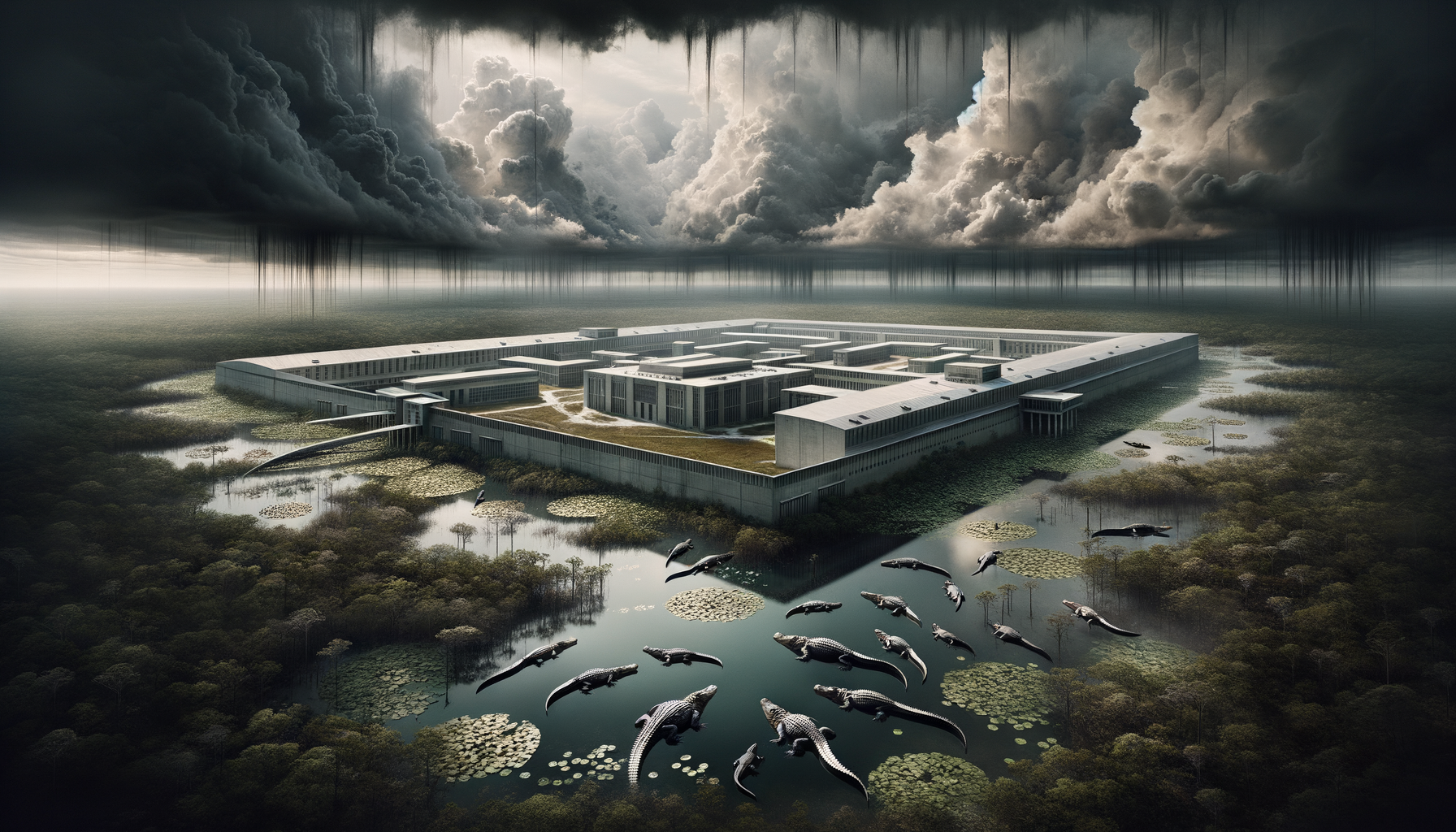Alligator Alcatraz Is Real—But Not Every Horror Story Checks Out
What’s true, what’s exaggerated, and what’s still a mystery inside Florida’s brand-new swamp prison.
Short answer up front
Yes, “Alligator Alcatraz” exists. Yes, detainees—like 63-year-old Fernando Artese—describe filthy, crowded conditions. But ICE does not run the compound, the fundraising total is lower than first reported, and at least two dramatic details remain unverified.
Keep reading to see how a family road trip ended in a hurricane-proof cage, why officials insist everything is “state-of-the-art,” and where the evidence really points.
1. The swamp fortress nobody asked for
On 3 July 2025, a remote corner of Big Cypress National Preserve, about 40 miles west of Miami, opened its gates to migrants. Reporters quickly dubbed the site “Alligator Alcatraz”—equal parts marketing and menace.
- Verified facts
- Location: the disused Dade-Collier Training & Transition Airport (source: AP, Wikipedia).
- Capacity: official paperwork says up to 5,000 beds; some press releases quote 3,000.
- Tour date: President Donald Trump, Gov. Ron DeSantis, and DHS Secretary Kristi Noem walked the grounds on 1 July 2025, praising the “miles of swamp” as a natural moat (PBS transcript).
The optics were stark: a chain-link city in mosquito country, marketed as the place for “the worst of the worst.”
2. So who actually runs the place?
The original article claimed ICE “runs the facility.” That’s wrong.
- Corrected: Day-to-day control sits with the Florida Division of Emergency Management (DEM) in partnership with DHS. ICE transports detainees and staffs some units, but is not the operator (sources: El País).
Why the confusion? ICE buses arrive, ICE logos flash on uniforms, and detainees are federal holds. Yet the budget line and maintenance crews answer to Tallahassee, not Washington.
3. A vacation that ended in cuffs
Enter Fernando Artese, a dual Argentine-Italian citizen who had lived in Florida since 2014.
- 3 July 2025 – Traffic stop near Jupiter, FL for driving without a valid licence.
- A pre-existing warrant turns the stop into an arrest.
- Hours later he is on a bus to Alligator Alcatraz.
Family plan derailed
His 19-year-old daughter Carla says they were selling everything, driving west, then flying on to Spain. “We were two days in,” she told the Miami New Times. Next stop: razor wire.
All of the above is verified in Argentinian daily La Nación and Colombian paper El Tiempo.
4. Life on the inside: what’s confirmed
Detainees’ complaints line up across multiple outlets:
- Worms in food
- Broken toilets spilling sewage
- Mosquito swarms and temperature swings
- 30+ people per cage
- Only brief, scorching showers at 2 a.m.
These patterns appear in AP, CBS, Daily Beast, El Tiempo and more. Artese’s own descriptions match the chorus.
5. The pushback: “Fake news” or filtered truth?
- DHS called the stories “fake news” on X.
- Florida DEM insists water is “potable,” showers are “full-size,” waste is pumped daily.
But here a red flag pops up: the quoted e-mail from DEM spokesperson “Stephanie Hartman” cannot be found in any public record. Until a reporter tracks down Ms. Hartman or the e-mail, that detailed rebuttal stays unverified.
6. The claims that wobble
| Claim | Status | Why it’s shaky |
|---|---|---|
| Guards told detainees to line up to self-deport, then vanished | Unverified | No second witness or document |
| GoFundMe passed $5,000 | Partly true | Page shows $4,806 as of 16 July 2025 |
| ICE “runs” the facility | False | Operator is Florida DEM |
Transparency note: We searched news databases, the federal court docket, and the official DEM press portal—no corroboration found for the self-deport line or the Hartman e-mail.
7. Follow the money, follow the politics
• Funding: Fast-tracked by Florida’s GOP majority, the complex cost an estimated $280 million, according to state procurement records.
• Lawsuits: Environmental groups and the Miccosukee Tribe filed suit on 27 June 2025 to halt construction. Their injunction request is pending in federal court.
• Expansion plans: Trump said he wants “a couple more” sites in Florida and similar camps in other states (source: Hartmann Report).
8. What happens to Fernando now?
Artese says he will gladly sign removal papers to Italy. Under DHS policy, detainees who request “voluntary departure” can be processed in days—if they have a valid passport and no outstanding criminal warrants.
Yet his daughter claims no one has even told him how to apply. ICE’s media office did not answer our questions by deadline.
Carla’s fundraiser sits several hundred dollars shy of halfway. Whether an attorney can speed up the process—or simply confirm his status—remains to be seen.
9. The big picture
- The prison is real, and conditions look bad. Multiple independent outlets confirm overcrowding, sewage leaks and insect infestations.
- Some details were embellished. Management chain, fundraising total, and the dramatic “self-deport line” lack hard evidence.
- Accountability is murky. State runs the site, feds supply the detainees, each blames the other when things go wrong.
10. What we still don’t know
• How many official complaints or medical incidents have been logged since 3 July?
• Will the federal court halt operations over environmental or tribal claims?
• Can detainees realistically request voluntary departure—or is that just a talking point?
We’ll keep digging. If you have documents, photos, or firsthand accounts from inside Alligator Alcatraz, reach me securely at tips@swampwatch.news.
Bottom line
Alligator Alcatraz is no myth, but neither is every tale gospel. For Fernando Artese and the thousands now fenced in by sawgrass and alligators, the truth matters more than the headlines—and right now, the truth is still wrestling with the mosquitoes.
